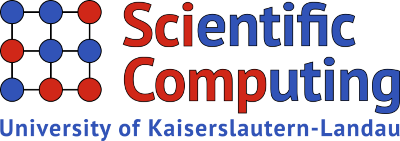Date and Place: Thursdays and hybrid (live in 32-349/online via Zoom). For detailed dates see below!
Content
In the Scientific Computing Seminar we host talks of guests and members of the SciComp team as well as students of mathematics, computer science and engineering. Everybody interested in the topics is welcome.
List of Talks
Event Information:
-
Thu10Nov2016
SC Seminar: Matthias Möller
11:30SC Seminar Room 32-349
Prof. Matthias Möller, TU Delft, Department of Applied Mathematics
Title:
Solving Compressible Flow Problems by Isogeometric AnalysisAbstract:
Isogeometric Analysis is a relatively new approach for the numerical solution of PDE-problems especially on complex geometries. It can be considered as a natural generalisation of the Finite Element Methods that aims at narrowing the gap between computational geometry modelling and numerical analysis. The key idea to achieve this goal is to adopt a common description of geometries and solution approximations by, e.g., B-splines or Non-Uniform Rational B-Splines (NURBS).
In this talk, we present our approach to develop an isogeometric compressible flow solver. It builds upon the generalisation of the algebraic flux correction paradigm to multi-patch Isogeometric Analysis as universal building block for the design of positivity-preserving high-order discretisation. Our implementation adopts Fletcher’s group formulation, which makes it possible to express the assembly of linear and bilinear forms in terms of sparse matrix-vector multiplications and element-wise vector operations with pre-computed coefficient vectors and matrices, respectively. This approach overcomes the high computational costs that are typically observed in quadrature-based assembly algorithms for high-order isogeometric methods.
We moreover discuss strategies for the efficient implementation of the proposed algorithm on heterogeneous multi-/many-core architectures making use of fast and smart expression templates for the typical building blocks like state vectors, fluxes and flux-Jacobians. This approach is combined with just-in-time compilation to generate hardware-optimised compute kernels thereby associating single patches of the discretisation with individual compute devices. We finally address the computational potential of this approach to be combined with algorithmic differentiation to develop adjoint-based optimisation tools.
